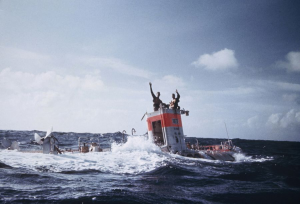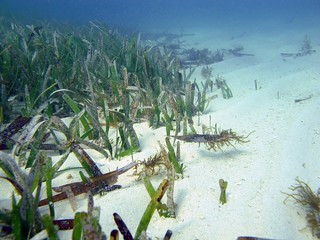
After their successful nine-hour dive in January 1960 to the bottom of the Pacific Ocean’s Mariana Trench, Don Walsh and Jacques Piccard emerge from the bathyscaphe Trieste. Walsh and Piccard were the first to reach the trench’s lowest point, Challenger Deep, some 35,800 feet below the ocean surface. Piccard, who died in 2008, was posthumously awarded the Hubbard Medal, the National Geographic highest honor, at a ceremony in Washington, D.C., on June 14, 2012. (Photo: Thomas J. Abercrombie)
Only three men have ever reached the ocean’s deepest point. Capt. Don Walsh and the late Jacques Piccard in 1960 and earlier this year, James Cameron. On June 14th, 2012, National Geographic bestowed its highest honor, the Hubbard Medal, posthumously to Jacques Piccard for his record-breaking dive to the Mariana Trench with Don Walsh in the bathyscaphe Trieste to a depth of nearly seven miles. Many of his efforts greatly contributed to the fields of oceanography and conservation.
Piccard comes from a family of explorers. His father, Auguste, was a physicist and the first man to take a balloon into the stratosphere. In 1999, Jacques Piccard’s son, Bertrand Piccard, together with Brian Jones, completed the first ever nonstop circumnavigation of the globe in a balloon.
Presenting the Piccard family with the Medal was Don Walsh, who received the Hubbard Medal in 2010 and James Cameron, the last and only other man to reach this depth.
Read more





